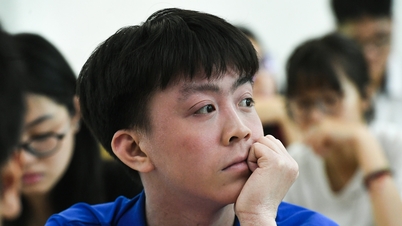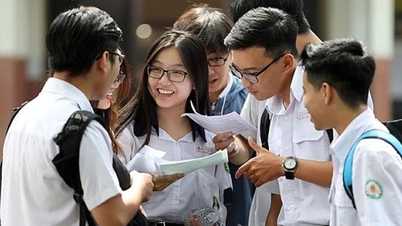According to The Spectator , in just a few weeks, hundreds of thousands of young people in the UK will enter university. Among them, many will not reach the initial standard score. The reason is that additional admissions have completely changed the admission picture.
The process has been likened to a Grand National steeplechase: tension and chaos as the starting gun goes off, contestants jostle for space, a frantic race ensues – but fewer and fewer are eliminated. The re-entry system absorbs virtually all remaining contestants, even placing them in unexpected places.
In the UK, students must take A-levels and apply through the national admissions system UCAS. Typically, schools set specific benchmarks, such as AAA for Classics at Cambridge University. If students fail or apply late, supplementary admission becomes a “side door” to help candidates fill the remaining places.
In the past, this opportunity was limited, forcing students to accept trade-offs: studying a major they did not want, or attending a school they did not intend. But the picture has changed. Schools are facing both a growing number of students and heavy financial pressure. In the past 50 years, the number of 18-year-olds entering college has tripled; in the 21st century alone, nearly a million more students have been added.

Admission pressure and financial race
UK university finances are increasingly difficult. Tuition fees are capped, not increasing as fast as training costs; income from domestic students is losing value every year. Meanwhile, the international student market - which brings in a large amount of revenue when tuition fees are four times higher - is shrinking. Since Brexit (Britain's exit from the European Union - EU), the number of EU students has dropped sharply; the 2023-2024 academic year also recorded a general downward trend in international students.
As a result, schools are eager to fill their quotas. Although Oxford, Cambridge, Imperial, St Andrews and LSE are not participating, most of the schools in the Russell Group (24 leading research universities in the UK) are participating with a series of courses still available. In 2023, this group alone will have up to 3,500 courses for admission through additional admission, an increase of more than 25% compared to the previous year. Notably, international students have even more options than domestic students: 4,504 courses compared to 3,883.
This year, many major universities such as King's College London, Durham, Manchester, Leeds, Nottingham, Exeter and Bristol still have places available. Opportunities for "hot" majors such as Medicine, Law or Dentistry are almost rare, but the number of vacancies in majors that require high scores is not small.
Supplementary admission is no longer just a “lifeline” for candidates who fail the exam, but opens up opportunities to change majors or study at more prestigious schools. In 2024, these two groups will account for a third of the participants, showing increasing flexibility.
Opportunities and concerns from the "side door" to university
While it creates more choice, the additional admissions process also raises concerns about the quality of the intake. The increasing number of surprise admissions has made the A-level and UCAS systems appear to have lost their original meaning.
One student who only achieved AAC was accepted into a History- Politics course at a top 20 Russell Group university, despite the standard being AAA. Another female student, who initially only had BCD for a social science course, was transferred to a top 30 Russell Group university.
Students are also cleverly exploiting “side doors”. One male student was rejected from studying Economics because he only got a BBC instead of an AAA, but took the opportunity to join an interdisciplinary program that combines Economics with another subject. Modern foreign languages – which are rarely chosen, accounting for less than 3% of A-levels – have also become “side doors” to top universities. Even students who only got a C in Spanish were accepted into the Russell Group, which usually requires an ABB.
Some schools even suggest that candidates take additional language courses or take a foundation year. Some students who only achieved UUU still went on to study Information Technology at a member school of the University of London, or passed Pharmacy at the Russell Group with only a "no fail" score.
But it’s unclear how this group will hold up in higher education, and whether the drop in standards is sustainable. If too many graduate with weak degrees and poor prospects, schools risk falling rapidly in the rankings. With artificial intelligence reshaping the job market, many students lucky enough to pass the supplementary admissions process may just be postponing disappointment.
Source: https://vietnamnet.vn/xet-tuyen-bo-sung-co-hoi-bat-ngo-de-vao-nhieu-truong-dai-hoc-danh-gia-2440425.html


![[Photo] General Secretary To Lam visits Kieng Sang Kindergarten and the classroom named after Uncle Ho](https://vphoto.vietnam.vn/thumb/1200x675/vietnam/resource/IMAGE/2025/10/09/1760023999336_vna-potal-tong-bi-thu-to-lam-tham-truong-mau-giao-kieng-sang-va-lop-hoc-mang-ten-bac-ho-8328675-277-jpg.webp)


![[Photo] President Luong Cuong attends the 80th Anniversary of the Traditional Day of Vietnamese Lawyers](https://vphoto.vietnam.vn/thumb/1200x675/vietnam/resource/IMAGE/2025/10/09/1760026998213_ndo_br_1-jpg.webp)

![[Photo] Prime Minister Pham Minh Chinh chairs a meeting of the Government Standing Committee on overcoming the consequences of natural disasters after storm No. 11](https://vphoto.vietnam.vn/thumb/1200x675/vietnam/resource/IMAGE/2025/10/09/1759997894015_dsc-0591-jpg.webp)































































































Comment (0)